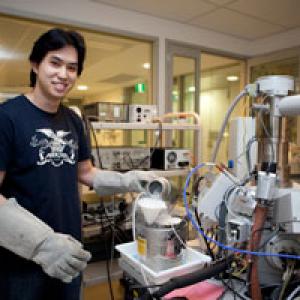
Olivier Lee
An honours degree gives you an edge and also provides you the capabilities for independent research.
What is Nanotechnology?
Nanotechnology is the control of matter at the nano- or atomic scale.
Why did you choose to major in this area?
The ability of nanotechnology to revolutionise the world was the main reason. Its possibilities are endless - tiny robots that could build anything from scratch, finding new sources of energy, finding cures for any disease, tiny computers.
What was it about the UTS course that attracted you?
The heavy practical side of the course was one of the major reasons, and being exposed to cutting edge technology from an early stage of the course was also appealing.
Why did you choose to do your Honours year? How do you think it will benefit you?
An honours degree gives you the advantage over people who just have a BSc when looking for a job because it shows that you have the capabilities required for independent research.
Please briefly describe your honours project and how it relates to Nanotechnology.
My honours project was to examine how the optical properties of zinc oxide nanowires and crystals changed when iron was introduced into them. Precisely controlling the optical properties of zinc oxide nanowires such as their emission wavelength would allow them to be used as building blocks for new electronic and optical devices such as in lighting.
What are your future plan?
I plan to further my studies to a PhD after my honours. It will be an extension of my honours project - it will be about growing zinc oxide nanowires with the required optical properties, as opposed to tuning them through doping after they have been grown. I am also aiming to understand the science behind the luminescence in zinc oxide which is still not fully understood despite having been a subject of research for the last 50 years.
